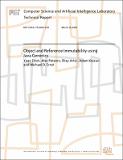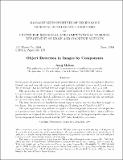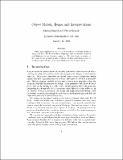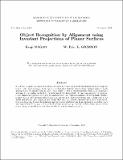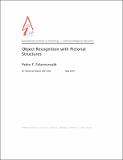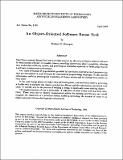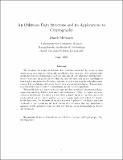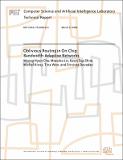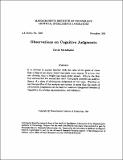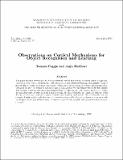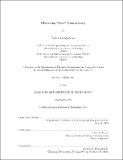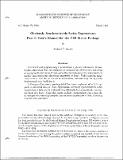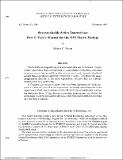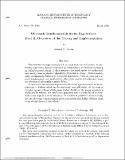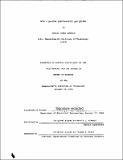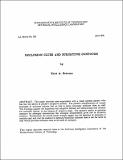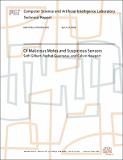Browsing Computer Science and Artificial Intelligence Lab (CSAIL) by Title
Now showing items 2247-2266 of 3804
-
Object and Reference Immutability using Java Generics
(2007-03-16)A compiler-checked immutability guarantee provides useful documentation, facilitates reasoning, and enables optimizations. This paper presents Immutability Generic Java (IGJ), a novel language extension that expresses ... -
Object Detection in Images by Components
(1999-08-11)In this paper we present a component based person detection system that is capable of detecting frontal, rear and near side views of people, and partially occluded persons in cluttered scenes. The framework that is ... -
Object Models, Heaps and Interpretations
(2001-01)This paper explores the use of object models for specifying verifiable heap invariants. We define a simple language based on sets and relations and illustrate its use through examples. We give formal semantics of the ... -
The Object Partition Problem
(MIT Artificial Intelligence Laboratory, 1971-02) -
Object Recognition By Alignment Using Invariant Projections of Planar Surfaces
(1994-02-01)In order to recognize an object in an image, we must determine the best transformation from object model to the image. In this paper, we show that for features from coplanar surfaces which undergo linear transformations ... -
Object Recognition with Pictorial Structures
(2001-05-01)This thesis presents a statistical framework for object recognition. The framework is motivated by the pictorial structure models introduced by Fischler and Elschlager nearly 30 years ago. The basic idea is to model an ... -
An Object-Oriented Software Reuse Tool
(1989-04-01)The Object-oriented Reuse Tool (ORT) supports the reuse of object-oriented software by maintaining a library of reusable classes and recording information about their reusability as well as information associated with their ... -
Oblivious Routing in On-Chip Bandwidth-Adaptive Networks
(2009-03-27)Oblivious routing can be implemented on simple router hardware, but network performance suffers when routes become congested. Adaptive routing attempts to avoid hot spots by re-routing flows, but requires more complex ... -
Observations on Cognitive Judgments
(1991-12-01)It is obvious to anyone familiar with the rules of the game of chess that a king on an empty board can reach every square. It is true, but not obvious, that a knight can reach every square. Why is the first fact obvious ... -
Observations on Cortical Mechanisms for Object Recognition andsLearning
(1993-12-01)This paper sketches a hypothetical cortical architecture for visual 3D object recognition based on a recent computational model. The view-centered scheme relies on modules for learning from examples, such as Hyperbf-like ... -
Observing "True" Concurrency
(1993-09)In concurrent process theory, processors are often modeled by state machines and Petri Nets. Algebraic process theories based on state machines, exemplified by Milner's CCS and Hoare's CSP, have been more fully developed ... -
Obviously Synchronizable Series Expression: Part I: User's Manual for the OSS Macro Package
(1988-03-01)The benefits of programming in a functional style are well known. In particular, algorithms that are expressed as compositions of functions operating on series/vectors/streams of data elements are much easier to ... -
Obviously Synchronizable Series Expressions: Part I: User's Manual for the OSS Macro Package
(1987-10-01)The benefits of programming in a functional style are well known. In particular, algorithms that are expressed as compositions of functions operating on series/vectors/streams of data elements are much easier to ... -
Obviously Synchronizable Series Expressions: Part II: Overview of the Theory and Implementation
(1988-03-01)The benefits of programming in a functional style are well known. In particular, algorithms that are expressed as compositions of functions operating on series/vectors/streams of data elements are much easier to ... -
OCAS - On-line Cryptanalytic Aid System
(1966-05)Deficiencies of various programming languages for dealing with quantities frequently encountered in cryptanalysis of simple cipher systems will be discussed. A programming system is proposed which will permit a cryptanalyst ... -
Occlusion Clues and Subjective Contours
(1976-06-01)The paper describes some experiments with a visual agnosia patient who has lost the abillity to perceive subjective contours. The patient's interpretations of simple examples of occlusion indicate that he fails to ... -
Of Malicious Motes and Suspicious Sensors
(2006-04-19)How much damage can a malicious tiny device cause in a single-hopwireless network? Imagine two players, Alice and Bob, who want toexchange information. Collin, a malicious adversary, wants to preventthem from communicating. ... -
An Office Analysis and Diagnosis Methodology
(1983-03)With the advent of computer technology designed for use in the office, office analysis, or the process of understanding office work for the purposes of introducing technology, has become increasingly important. The Office ... -
Office Analysis: Methodology and Case Studies
(1983-03)The Office Analysis Methodology (OAM) is a structured methodology for understanding the current operations of an office. OAM provides guidance in interviewing techniques and approaches to establishing a positive atmosphere ...

